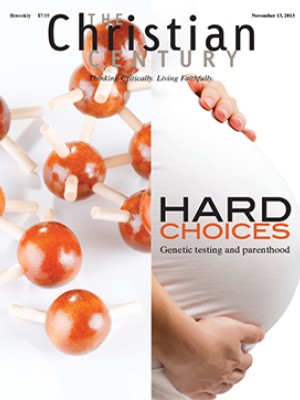If it is not ‘mainline,’ what is it?
Is there a better name for mainline Protestants? How about vintage Protestants? Or the VPCC—Vanishing Progressive Christian Church? Or the Legacy Church?
Half a century ago, the denominations under the mainline umbrella dominated the American faith landscape. Now, after decades of decline in numbers, only about one in five adults identifies with a mainline denomination such as the United Methodist Church, the Episcopal Church, the Evangelical Lutheran Church in America, the Presbyterian Church (U.S.A.) or the American Baptist Churches USA.
Could replacing the “mainline” label help stem the slide? The challenge to find a new name came from scholar and Presbyterian pastor Carol Howard Merritt. Writing on her blog, hosted by the Christian Century, she called for a new brand that conveys her view of the mainline’s rising diversity and social justice leadership.
Read our latest issue or browse back issues.
“The image of an all-white, elitist church is not going to fly for generations to come,” said Merritt, an author and speaker who lives in Chattanooga, Tennessee “‘Mainline’ was a good historic marker, but the future needs to reflect who we are now.”
Religion News Service took up the challenge, inviting votes and comments in an informal survey. More than 200 people voted. The comments ranged from theological to historical, serious to snarky.
“Liberal Church” led with 24 percent of the votes. Some liked the social and political connotation, but others used liberal as a slam on a church they regard as too loose on doctrines of sin and salvation. Merritt said October 15 that she preferred a different spin on liberal: “Liberationist Church,” because “it taps into the good news that our beliefs lead us to seek liberation for all the oppressed, to expand freedom for all.”
Next, at 17 percent, were those who said labels just don’t work for religious distinctions anymore. National surveys find growing numbers just want to call themselves “Christian.”
“Oldline” was favored in 6 percent of the votes. “Grandma’s Church” drew 3 percent. It has the ring of truth: mainline churches have the greatest percentage of members age 65 and older of any Christian tradition.
Most folks—46 percent—preferred their own picks.
Fans of the mainline highlighted historical faith and social gospel activism:
The “Refined Church” came from Carlton E. Allen. “The term plays off of Reformed” but suggests a church that has been “through the fire . . . tried and tested and resistant to fads.”
Social scientist and blogger Mark Silk would stick with mainline because “it identifies a social location in American communities—a religious tradition that takes a broad view of its responsibilities to the community at large—that continues to serve as meaningful shorthand.” Alicia Lowry Walker wrote that the old name worked fine to attract her to a mainline congregation that is growing “primarily due to young families from evangelical backgrounds like mine.”
John McGrath suggested “Forward Christians” because, he says, “these denominations generally move forward as the meaning of scripture unfolds through better scholarship, translation, and prayerful reflection on the essential humaneness of Christ.”
Critics, however, skewered the mainline as a theological washout.
Shawne Rantlett called them “the Churches Formerly Known as Christian, or the Syncretist Churches.”
Ken Peters suggested “the Unorthodox Churches. Their liberalized doctrines should be noted as unorthodox.”
Martha Carlson had another twist: “Since the evangelicals are now claiming majority, we should start calling them Mainline! They could then bear the weight of being ‘established,’ ‘establishment,’ or at least all being tarred by the same brush when it comes to popular opinion that all the members of a group think alike.”
John Leech offered “Legacy Denominations” because, he wrote, they are “like legacy airlines, carrying a lot of baggage from the past . . . But wait! I still have lots of miles to redeem!”
Merritt’s own first choice: “Social Justice Christian.” She said the term conveys “the exciting and vibrant thought that has come out of our tradition in the last hundred years or so [to] . . . proclaim the good news that leads us to liberation and salvation.” —RNS
This article was edited on October 28, 2013.





